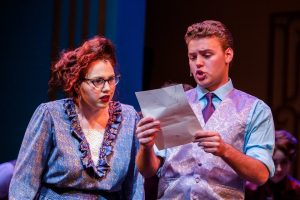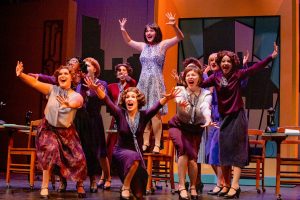
Cynthia Kauffmah – Courtesy of Summer Stock Stage. Used with permission.
Those who read me regularly know what a fan I am of Summer Stock Stage, the seasonal program that provides on-stage opportunities for high school students from a number of high schools in Central Indiana. So, it should not be a surprise that, once again, I am compelled to sing the praises of yet another of its shows. The one in question was “Thoroughly Modern Millie,” which I saw on Friday, during closing weekend at Indiana Repertory Theatre on its main stage. Since its usual home, Park Tudor School, is currently under renovation, the company is using other spaces this summer.
What makes the SSS program so singular is the leadership of co-founder Emily Ristine Holloway. Her group’s focus on artistic quality and professional polish is a cut above other high school theatre programs in the area and it shows. Consequently, not only the program’s participants, but local audiences are the beneficiaries of her vision.

L-R Julia Murphy & Nate Schlabach – Courtesy of Summer Stock Stage. Used with permission.
And no better example of its artistic product was “Thoroughly Modern Millie.” With music by Jeanine Tesori and lyrics by Dick Scanlan, the musical, considered a comedy-pastiche, premiered on Broadway in 2002, starring Sutton Foster in the title role. It’s based on the 1967 film of the same title, starring Julie Andrews. Set in the 1920s, it tells the story of small-town girl Millie Dillmount, who comes to New York to marry into wealth, rather than settle simply for love. With an eye toward snagging a rich husband, Millie becomes a working girl. Adopting a flapper-era attitude and embracing its liberating lifestyle, Millie seeks to be viewed as “modern.” Complications arise, however, when she takes up residence in a hotel for women, owned by the villainous leader of a white slavery ring in China.
Produced and directed by Holloway, “Millie” was choreographed by Cherri Jaffee, with Lily Wessel serving as her co-choreographer. And though the show’s direction, production elements and certainly its stellar acting and vocal performances deserve praise, it was the show’s choreography that really stood out. Heavy on tap dancing, the ebullient choreography that was crisp and tight and near-flawlessly executed by company members that numbered 43, was the real star of the show.

Abby Anderson as Muzzy Van Hossmere – Courtesy of Summer Stock Stage. Used with permission
My guest accompanying me, a musician and music director, remarked that the show’s 23-piece orchestra had a “Broadway-quality sound,” an observation with which I promptly concurred. Conducted by music director Michael Berg Raunick, the orchestra’s rendition of Tesori’s infectious score filled the IRT house with an air of exuberant, romantic nostalgia, fitting for the historic building, built in the late 20s, the same period in which “Millie” takes place.
Again, for those who’ve read my previous reviews of SSS shows, it bears repeating, while watching the performers, I always imagine some of them making it to Broadway one day. Considering I have seen at least five former SSS performers both in NYC and in touring productions, I now realize that such predictions for certain cast members are not outside the realm of possibility.

Cynthia Kaufffman and ensemble. – Courtesy of Summer Stock Stage. Used with permission
Standing out in “Millie” was Cynthia Kauffman, who starred in the title role. Her belting performance of “Gimme, Gimme” was one of the most thrilling musical theatre solos I have ever witnessed. Samantha Grace Shelton, gifted with an exquisite soprano voice, thoroughly shined as aspiring actress Miss Dorothy Brown. Showing leading-man potential in the big leagues, in both the vocal and dramatic departments, were Jack Ducat as lovelorn Jimmy Smith, and Nate Schlabach asMillie’s obsession, Trevor Grayden. Born to take center stage and doing so effectively with powerhouse vocals was Abby Anderson as larger-than-life entertainer Muzzy van Hossmere. Eva Scherrer as unscrupulous hotel landlord Mrs. Meers, and Julia Murphy as Millie’s stern steno pool supervisor Miss Flannery, both showed talent and skill as colorful character actors. Turning in fine performances in what could have been stereotypical characterizations of Chinese immigrants, but did not cross the line, were Faye Coy as Bun Foo and Christian Barda as Ching Ho, her brother. Most impressive was their use of what sounded like fluently spoken Chinese.
Every time I leave a Summer Stock Stage show, I feel uplifted and hopeful. “Millie” was no exception. As musical theatre is my favorite genre, it gratifies me that talented, neophyte performers exist to carry the torch. Doing its part to ensure the future of this uniquely American art form, Summer Stock Stage continues to set the bar high for the quality of training it offers. Based on the enthusiastic full houses its show’s attract, it’s popularity continues unabated.
For tickets and information about “Into the Woods,” the next Summer Stock Stage attraction, July 25-28 go to www.summerstockstage.org





